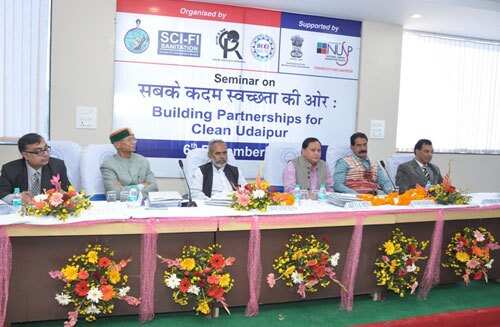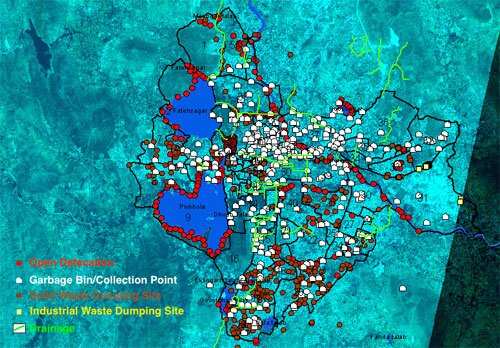Udaipur outpasses National Average in Sanitation Parameters
Though just 15% of the households in the city is connected to an underground sewerage system, yet Udaipur stands above the national average in other parameters related to sanitation and cleanliness.

The seminar was organized to bring various stakeholders from the government, civil society, academia, industry on a platform to create a common agenda for a clean city.
Though just 15% of the households in the city is connected to an underground sewerage system, yet Udaipur stands above the national average in other parameters related to sanitation and cleanliness.
‘Against the national average of 81 %, in Udaipur 94 percent of urban households have individual toilets and 77 percent of these have septic tanks’ said Shubagato Dasgupta, senior fellow of Center for Policy Research (CPR) New Delhi, the country’s oldest independent think tank to advise the government on various policy matters.
Dasgupta was addressing a seminar on ‘Building partnerships for clean Udaipur’ held at the Udaipur Chamber of Commerce and Industry (UCCI) here on Saturday. In tune with the Swachh Bharat mission, the seminar was organized to bring various stakeholders from the government, civil society, academia, industry on a platform to create a common agenda for Swachh Udaipur.

“There is a shortfall of community toilets as the data from the survey indicates only 1.6% public toilets in the city whereas the national average is 6 percent” Dasgupta informed.
CPR is partnering with Vidhya Bhawan Polytechnic college here on a research ‘Scaling City Institutions for India (SCI-FI) which aims to inform and support the formulation and implementation of the central governments urban sanitation programs and investments.
The research program studies Udaipur in Rajasthan and Balasore in Odisha to understand the reasons for poor sanitation and further support the state and city governments in modifying their urban sanitation programs so that they are supportive of alternative technology and service delivery models, with the goal of increasing access to safe and sustainable sanitation in urban areas.
In the technical session, Anil Mehta the Principal of Vidhya Bhawan college presented a comprehensive Geographic Information System (GIS) map of Udaipur city indicating the open defecation spots around the water bodies which he implies was a major threat to the public health. “We came across areas still having drop toilets functioning on the principles of manual scavenging which was shocking for us” said Mehta in his revelations of the survey done.
During the technical sessions Sudhir Dave, the Chief Planning officer of the UIT illustrated work undertaken under the Action Udaipur campaign to seek public participation in urban sanitation. K.S. Morgra, the former president of the UCCI explained about the Hazardous Industrial Waste Treatment Facility developed by the chamber. Sushma Sharma, head of the CSR, Hindustan Zinc Limited made a presentation on the company managed Sewage Treatment Plant.
The seminar also focused on building partnerships for a Swachh Udaipur by exploring ways in which the vibrant civil society and private sector can engage with the district administration and Urban Local Bodies to focus some efforts towards building a totally sanitized, liveable and healthy Udaipur.
MP Arjunlal Meena, legislator Phool Singh Meena, Mayor Chandra Singh Kothari, Ex-Mayor Rajni Dangi, G.S Taunk, the Former Chairman of the RPSC, Chief Medical and Health Officer Dr Sanjeev Taunk, Dr Riyaz Tehsin, president VidyaBhawan, Vinod Kumat, president UCCI were the eminent personalities to address the gathering.
Contributed by: Geetha Sunil Pillai
To join us on Facebook Click Here and Subscribe to UdaipurTimes Broadcast channels on GoogleNews | Telegram | Signal


